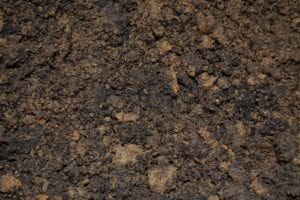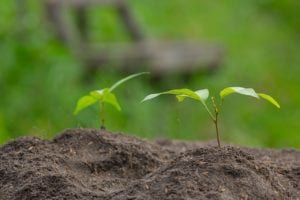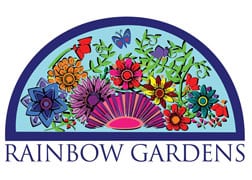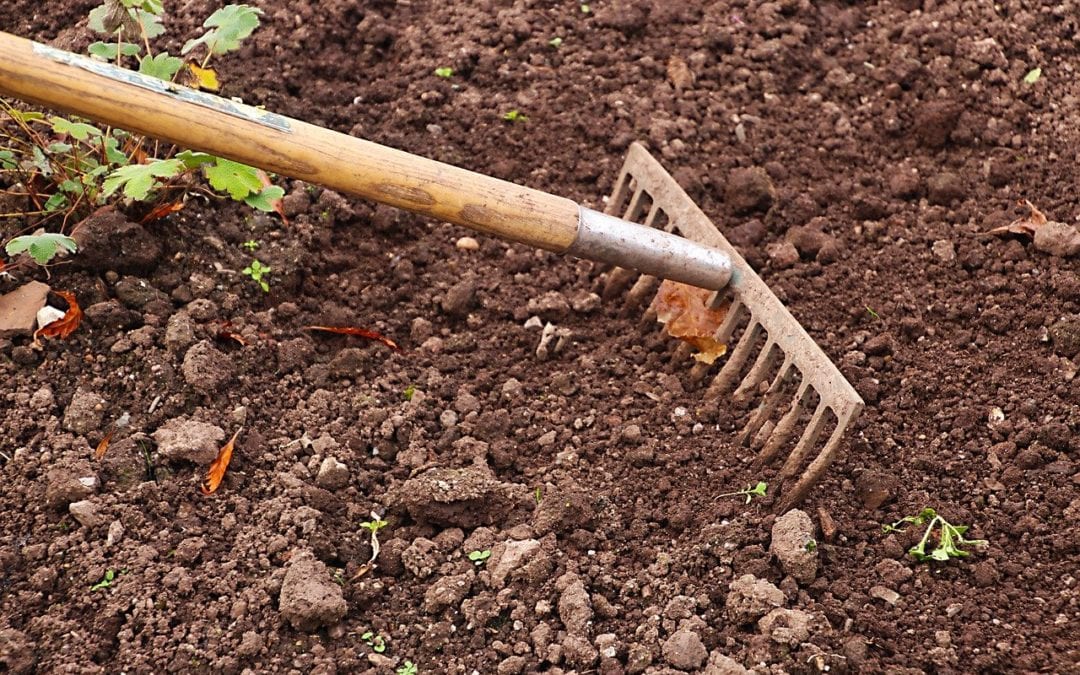We’ve spread the word for years that the foundation of gardening success begins with your soil. When you’re at Rainbow Gardens, it’s really hard to think about soil when there are so many beautiful, colorful plants surrounding you. However, I promise that if you put your soil first and maintain its health, you will enjoy the beauty of your healthy plants for a much longer time than if you don’t. Organic products are the gateway to your healthiest soil.
The world beneath the surface of soil is alive! It’s a complex ecosystem teeming with beneficial microorganisms. When you choose gardening products like organic fertilizers you work with the microorganisms in the soil rather than against them.
Using organic products when gardening truly improves the quality of your soil. Quality soil improves the performance of your plants. Plants that perform well have less disease or pest issues. Let’s face it, this improves the quality of gardeners’ moods. Am I right? Let’s take a look at how organic products can improve your soil and set you on the right path for long-term gardening success.


When you make the switch to organic fertilizers and products you will need to switch your mindset from “instant gratification” to “good things are worth the wait.” Organic products do take their sweet time breaking down their ingredients in order for plants to be able to use them. However, once they do, their benefits last a long time. Organic fertilizers are slow-release and naturally offer your plants nutrients over time. This is the way plants are supposed to take up nutrients (as opposed to a big push all at once). This is why when choosing an organic fertilizer for your lawns, you need to apply it about a month or two earlier than what’s recommended for applying synthetic lawn fertilizer.
Sure, if you choose synthetic fertilizers you might see results quicker, but the results don’t necessarily stick around for the long run. Many synthetic fertilizers contain salts and other nasty chemicals that could burn up newly planted young plants. (Not to mention the way they fry beneficial nematodes and the little earthworms that toil in your soil for free!) Instead of adding lasting nutrients to your soil to regenerate beneficial microorganisms, synthetic fertilizers deplete your soil of nutrients.
Long-term use of synthetic fertilizers will eventually degrade your soil down to sublevel dirt. This is not the ideal environment to grow healthy plants in. If you are looking for a quick fix, synthetic fertilizers may be for you. If you are into long-term gardening success, you might want to switch over to organic fertilizers that continuously feed and improve your soil.
Most synthetic fertilizers contain the necessary elements nitrogen, phosphorous, potassium, but they usually don’t provide much more. While these are the most important nutrient elements for plant growth and root development, they are being delivered to your plants chemically. Your plants might not know the difference between chemical and organic nutrients, but your soil sure does, and eventually, your plants will show the difference.
Organic fertilizers also contain nitrogen, phosphorous, and potassium, but they are derived from animal, mineral or plant material instead of being derived from chemicals. Most organic fertilizers also incorporate additional secondary nutrients and micronutrients.
Choosing between organic fertilizer and synthetic fertilizer is choosing whether you want to build a lasting, healthy foundation to continuously feed and nurture your plants or a quick, but fleeting solution. Sorry, but not sorry, for laying it out like that.
It’s not prudent or helpful to mix and match when it comes to synthetic fertilizers and organic fertilizers. There is no reason to purchase an organic fertilizer if you are just going to follow it up with a synthetic version that will kill off all the beneficial microorganisms that have been developing in your soil.
5 Ways to add Organic Fertilizer to Your Soil
- Organic Compost: Organic compost is one of the easiest ways to add nutrients to your gardens and lawns. By adding organic compost to your gardens each season, or a layer of organic compost to your lawn, you will find that you spend less and less on fertilizer each year.
- Cover Crops: Cover crops are also called “green manure”. If you incorporate planting cover crops for those seasons when you are taking a break from your garden, the next season you can turn them over and into the garden plot and you’ve got free fertilizer for your vegetables or flowers. Hooray! Cover crops are an awesome way to add nutrients to your soil, especially throughout winter when many gardens end up empty and fallow. Learn more about cover crops at the link.
- Organic Nitrogen Sources: Nitrogen is what gives plants their vibrant, healthy, green color and it helps to stimulate rapid growth. Organic sources of nitrogen include but are not limited to: bat guano, earthworm castings, fish meal, manure, blood meal, alfalfa meal, cottonseed meal, and even coffee grounds
- Organic Phosphorous Sources: Phosphorous is important for stimulating root development, and for successful formation of seeds. Organic sources of phosphorous include but aren’t limited to: rock phosphate, bat guano, and bonemeal
- Organic Potassium Sources: Potassium is important for disease resistance, helps create strong stalks, and improves quality and abundance of crops. Organic sources of potassium include but aren’t limited to seaweed (kelp), and greensand.
Rainbow Gardens sells multiple lines of premium complete organic fertilizers as well as many of the organic sources listed above, neatly packaged up in bags for your convenience.
While we always offer options for both the organic and synthetic gardener, it is our goal to inform you of the differences. This way you can make an educated decision on which type of fertilizer will be best for the type of gardener you wish to be. Personally, I am organically-biased but it hasn’t always been this way. I was turned on to the organic approach to gardening by learning about the benefits of organic gardening at our seminars and events, lots of personal research, and through observation of my own plants. My plants have never been happier and neither have I.
My hope is that I’ve given you enough information to at least start thinking about going organic when it comes to the fertilizer and products you choose for your gardening needs. At Rainbow Gardens, we are always here to help. The spring season is on the way!
~The Happy Gardener, Lisa Mulroy


Will this help improve the quality of my vegetables?
Absolutely! Healthy soil means the healthiest of vegetables!
Due to budget, if you had to pick one packaged organic product for raised beds, what would you recommend? Same question for lawns. Any other specific recommendations if trying to work within a reasonable budget?
Thanks for all the great advice!
Hi Zac,
Sorry for the delay, I’ve been out due to surgery. Can you let me know what type of product you are inquiring about? Soil? Soil amendment? Fertilizer? Pest or Disease Control? I’m not sure which you are asking about.